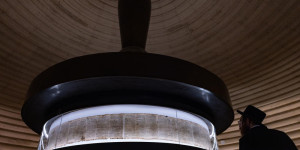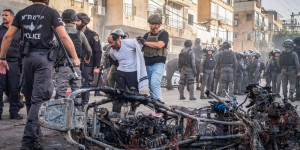Israel seeks to wrap up the war fearing prolonged campaign; Trump ups rhetorical pressure
Nuclear program was thrown back by at least 10 years, Israeli officials estimate

After ten days of war against the Iranian regime and following the U.S. strikes on the regime’s nuclear sites, Israeli officials signaled on Sunday that they would be ready to end Operation Rising Lion in the coming days.
Meanwhile, U.S. officials have stressed they don’t seek to continue military action against Iran but warned the regime against retaliation against U.S. targets in the region.
The Iranian regime, however, has not shown any signs of readiness to compromise, which possibly caused U.S. President Donald Trump to float the idea of “regime change” for the first time in a Sunday post to his social media site Truth Social.
“It's not politically correct to use the term, 'Regime Change' but if the current Iranian Regime is unable to MAKE IRAN GREAT AGAIN, why wouldn't there be a Regime change??? MIGA!!” the president wrote.
Earlier Sunday, Vice President JD Vance had told NBC: “We do not want to protract this or build this out any more than it's already been built out. We want to end their nuclear program, and then we want to talk to the Iranians about a long-term settlement here.”
In Israel, Prime Minister Benjamin Netanyahu said that Israel is “very, very close to completing” the goals of the war, namely, to defuse the “nuclear threat and the ballistic missile threat.”
Several Israeli officials reiterated that same message in briefings to various Israeli media outlets on Sunday.
Ynet News cited officials who said, “If Khamenei halts the firing tomorrow and says he wants to end the event, we will accept that.”
Nevertheless, the officials added that the Israeli public should prepare for a “prolonged” war. “It’s not up to us – it’s up to the Iranians. If the Iranians go into a war of attrition with us, this will be a prolonged campaign, and it will take more time. But that’s not what we want. We want to close this event in the near term – this week – and if that happens, it’s up to Khamenei. If he continues firing nonstop, we will have to respond – we won’t be able to absorb it. Our interest is not to prolong this event.”
Army Radio confirmed that the Israeli security establishment’s main fear is a war of attrition, where Iran would continue to periodically fire missiles at Israel, similar to the Houthis in Yemen.
“We will intensify our strikes in Iran in the coming days – with the goal of cornering Khamenei. Our objective is to achieve our goals within the next few days and then to reach a tacit understanding of ‘quiet will be met with quiet,’ and both sides cease their attacks. That’s what we want to happen – but it’s likely that Khamenei will want otherwise. He’s lost the project of his life, built over decades, and it’s not certain he’ll act rationally,” senior military officials told Army Radio.
Meanwhile, Israel doesn’t expect the U.S. to continue attacking Iran: “From the Americans’ perspective, as we understand it, they’ve ‘done their part,’ and now we are required to continue and complete the mission. If Iran or its proxies attack the U.S. – it’s possible they will resume attacks in Iran.”
In the case that the war continues, the officials stressed that the Israeli Air Force still has a “vast” target bank of ballistic missile infrastructure, air defense systems, launchers, regime-related targets, targeted assassinations of officials, nuclear labs, and more.
The officials who spoke to Ynet stressed that Israel continues “to produce interceptors, and the defense establishment has increased the budget,” and that the air force continues hunting missile launchers to further reduce the Iranian fire capabilities.
“We’ve destroyed more than 50% of the launchers. Around 200 remain. As for missiles, they have about 1,500,” the officials estimate.
Regarding the extent of the damage to the nuclear program, they noted that there is no definitive assessment yet. Israel estimates “that the Iranians were unable to remove enriched materials, and if they did – it was in a minimal quantity.”
“Our assessment is that the bulk mass of several hundred kilograms was not removed – and was destroyed in the strikes,” they said.
“The assessment is that we’ve pushed it back more than a decade.”

The All Israel News Staff is a team of journalists in Israel.













